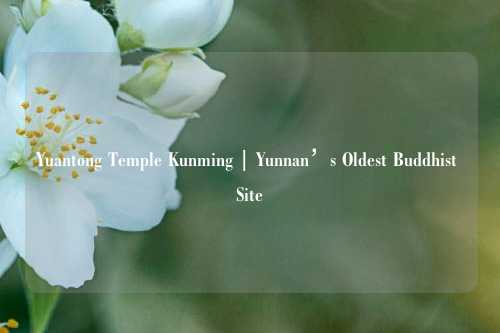Yuantong Temple Kunming | Yunnan’s Oldest Buddhist Site
The Timeless Legacy of Yuantong Temple
Nestled in the heart of Kunming, the capital city of Yunnan Province, Yuantong Temple stands as a testament to the rich and spiritual heritage of China. Known as Yunnan’s oldest Buddhist site, this temple has been a beacon of faith and history for over 1,200 years. Its name, "Yuantong," translates to "Eternal Peace," reflecting the serene atmosphere that surrounds this ancient place of worship. Visitors to Yuantong Temple are not only greeted by its architectural splendor but also by the sense of tranquility that permeates its halls and courtyards.

A Glimpse into History
Yuantong Temple was first constructed during the Tang Dynasty (618-907 AD) under the reign of Emperor Gaozu of Tang. Originally known as "Jingci Temple," it was later renamed "Yuantong Temple" during the Song Dynasty (960-1279 AD). Over the centuries, the temple has undergone numerous renovations and expansions, especially during the Ming (1368-1644 AD) and Qing (1644-1912 AD) dynasties, which left a lasting mark on its architecture. Today, Yuantong Temple stands as a fusion of ancient and modern, with its original structures carefully preserved amidst the bustling city of Kunming.
The temple’s historical significance is not limited to its architecture. It has played a role in the propagation of Buddhism in Yunnan Province, serving as a central hub for religious and activities. Its influence has extended beyond religious practices, shaping the social and artistic tapestry of the region. Visitors can witness this legacy through the carvings, vibrant murals, and antique statues that adorn the temple’s premises.
Architectural Marvels
Yuantong Temple’s design reflects the blend of Chinese Buddhist architecture and local influences. The temple’s main hall, known as the "Daxiong Bao殿" (Great Hall of the Central Shrine), is a masterpiece of Chinese architecture. Its towering eaves, ornate roof tiles, and grand entranceway capture the essence of classical Chinese temple design. The hall is home to a impressive statue of the Buddha, flanked by his attendants and bodhisattvas, each ly crafted to reflect the artistic styles of their respective eras.
Adjacent to the main hall is the "Maitreya Hall," dedicated to the future Buddha, Maitreya. The hall is known for its striking statue of the Laughing Buddha, symbolizing joy and compassion. This statue has become an iconic image of Yuantong Temple, often featured in photographs and postcards.
The temple’s courtyards are equally impressive, with neatly manicured gardens, stone pagodas, and serene ponds that provide a peaceful retreat from the city’s hustle and bustle. The sound of flowing water and the gentle rustling of leaves create a soothing ambiance, inviting visitors to pause and reflect.
Cultural and Spiritual Significance
For Buddhists, Yuantong Temple is more than just a historical site—it is a place of worship and spiritual renewal. Pilgrims from across China and around the world come to the temple to pay their respects, offer prayers, and seek enlightenment. The temple’s religious significance is further amplified by its role in hosting various Buddhist rituals and festivals throughout the year.
Even for non-Buddhists, a visit to Yuantong Temple offers a opportunity to immerse oneself in the rich and spiritual traditions of China. The temple’s serene atmosphere and beautiful architecture make it a popular spot for meditation, reflection, and personal exploration.
Exploring the Temple’s Modern Appeal
While Yuantong Temple is deeply rooted in history, it is far from being a relic of the past. Today, it stands as a vibrant hub of and spiritual activity, attracting both locals and tourists alike. Its enduring appeal lies in its ability to ly blend ancient traditions with modern innovation, making it a destination for all who visit.
A Destination for Travelers
Kunming, known as the "City of Eternal Spring," is a city of stunning landscapes and vibrant culture. Yuantong Temple, sitting at the heart of this dynamic urban center, offers a perfect respite from the city’s fast-paced rhythm. Its lush gardens, architecture, and serene ambiance provide a serene contrast to the bustling streets of Kunming.
For travelers exploring Yunnan, Yuantong Temple is an essential stop. It offers a glimpse into the region’s rich Buddhist heritage and provides a peaceful setting for relaxation and reflection. Whether you’re a seasoned traveler or a first-time visitor, the temple’s charm is sure to leave a lasting impression.
Cultural Festivals and Events
Throughout the year, Yuantong Temple hosts a variety of and religious events that showcase the vibrancy of its traditions. One of the most events is the "Buddha’s Birthday" celebration, held on the full moon day of the fourth lunar month. During this time, the temple is illuminated with thousands of lanterns, and visitors can participate in prayers and rituals to honor the birth of the Buddha.
The temple is also a popular venue for meditation retreats and Buddhist study programs. These events attract people from all walks of life, offering them the chance to deepen their understanding of Buddhism and find inner peace in a world full of distractions.
A Gateway to Yunnan’s Cultural Treasures
Yuantong Temple is not just a destination in itself but also a gateway to exploring Yunnan’s diverse heritage. As the oldest Buddhist site in the province, it serves as a bridge between the past and present, connecting visitors to the region’s spiritual and artistic traditions.
For those interested in Yunnan’s history, the temple offers a glimpse into the evolution of Buddhism in the region. Its walls bear witness to the influences of various cultures, including Chinese, Tibetan, and Indian, showcasing the temple’s role as a melting pot of ideas and traditions.
Conclusion
Yuantong Temple is more than just a historical site—it is a living testament to the enduring power of faith and culture. Its rich history, stunning architecture, and serene atmosphere make it a must-visit destination for anyone traveling to Kunming. Whether you’re drawn to its spiritual vibrations, historical significance, or simply its beauty, Yuantong Temple promises an unforgettable experience.
As you step into the temple’s gates, you are not just entering a physical space but stepping into a world of peace, history, and heritage. So, take a moment to pause, reflect, and let the timeless beauty of Yuantong Temple envelop your senses. It is a place where the past meets the present, and where the spirit of Yunnan’s oldest Buddhist site lives on, forever.
















